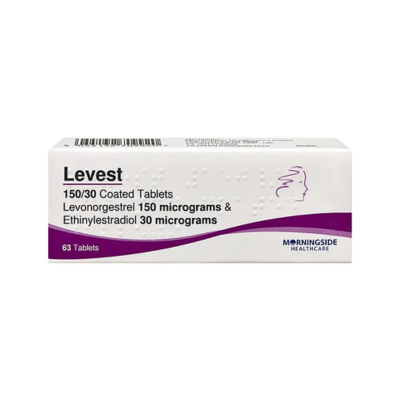Levest
- Reliable & Effective Contraception
- Helps Regulate Periods
- UK Regulated Pharmacy
Levest
Category:Contraceptives (Combined)Levest is a combined oral contraceptive pill containing two hormones that prevent pregnancy and help regulate menstrual cycles. It is taken daily for 21 days, followed by a 7-day break during which a withdrawal bleed occurs.
Fetching Data...
All inclusive services
No extra costs
Free tracked delivery
Delivered in plain packaging
Prescription included
No consultation charges
Frequently Asked Questions for Levest
What is Levest?
Levest is a monophasic combined contraceptive pill that contains two active ingredients: ethinylestradiol (oestrogen) and levonorgestrel (progestogen). These hormones work together to prevent pregnancy while also helping to manage heavy or painful periods.
How Does Levest Work?
Levest prevents pregnancy in three ways:
- Stops ovulation – prevents the ovaries from releasing an egg each month.
- Thickens cervical mucus – makes it harder for sperm to reach the egg.
- Alters the womb lining – reduces the likelihood of a fertilised egg implanting.
When taken correctly, Levest is over 99% effective at preventing pregnancy. However, it does not protect against sexually transmitted infections (STIs), so additional contraception (such as condoms) should be used for STI prevention.
How to Use Levest
- Starting the pill: Ideally, start Levest on day one of your period for immediate protection. If starting after day five, use extra contraception (e.g., condoms) for 7 days.
- Daily use:
- Take one pill at the same time every day for 21 days.
- After completing the pack, have a 7-day break before starting a new strip.
- A withdrawal bleed (similar to a period) should occur during the break.
Levest should be taken with water, and missing pills may reduce its effectiveness. If you experience vomiting or diarrhoea within 4 hours of taking Levest, it may not work effectively, and extra contraception should be used.
Possible Side Effects of Levest
Some individuals may experience mild side effects when taking Levest, though these often subside after the first few months.
Common side effects:
- Headaches
- Stomach aches
- Nausea
- Mood swings
- Breast tenderness
- Weight gain
Less common side effects:
- Low libido
- Migraines
- Skin rash
- Fluid retention
Rare but serious side effects:
- Blood clots (deep vein thrombosis, pulmonary embolism, heart attack, or stroke)
- Breast cancer (slight increase in risk)
- Allergic reactions
Seek immediate medical attention if you experience chest pain, swelling in the leg, vision problems, or difficulty breathing, as these may be signs of a blood clot.
Warnings & Precautions
Do NOT take Levest if you:
- Are pregnant or breastfeeding (within the first 6 weeks postpartum).
- Have ever had a blood clot, stroke, heart attack, or angina.
- Have high blood pressure, severe diabetes, or high cholesterol.
- Have migraines with aura.
- Have been diagnosed with breast cancer or liver disease.
Consult your doctor before taking Levest if you:
- Have inflammatory bowel diseases like Crohn’s disease or ulcerative colitis.
- Have lupus, sickle cell anaemia, or a history of liver problems.
- Have recently given birth and are unsure when to start contraception.
